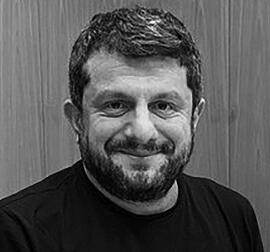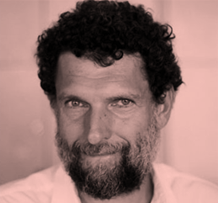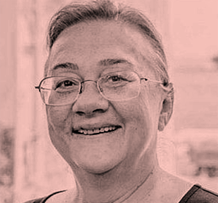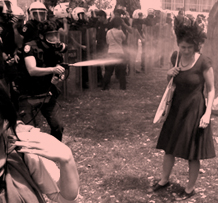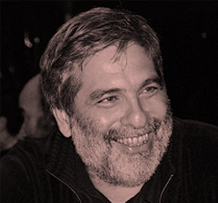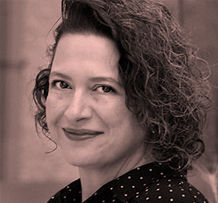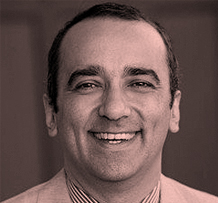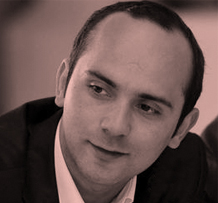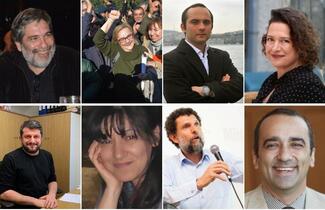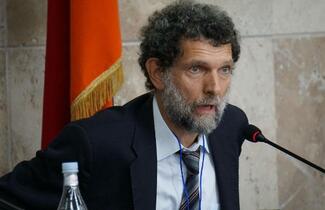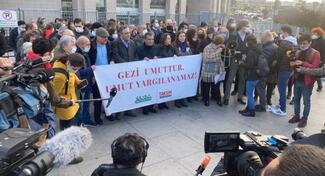For the past 20 years, Can Atalay has been present wherever there has been an aggrievement. As a lawyer, he defended the friends and families of the miners that died at Soma, those who lost their lives in the explosion at Hendek and at the Çorlu train massacre, and the children that were burned to death at the Aladağ sect dormitory. He was involved in the solidarity networks formed against the destruction of the Validebağ Grove and the demolition of the Emek Movie Theater. He became the lawyer for Taksim Solidarity against the attempt to build a shopping center at the Gezi Park. For this, he was detained, acquitted from two trials, and sentenced to 18 months in prison on the third trial.
Can Atalay is known for being a socialist since his student years. He supported the labor struggle his first few years after becoming a lawyer. He worked as a defender of rights on many social issues as a board member of the Association of Social Rights (Sosyal Haklar Derneği.) He took part in several defense cases for journalists including the Cumhuriyet Newspaper lawsuit.
He continued his search for justice for the victims of the sect dormitory fire where 12 people including 11 children burned to death, the Soma mining disaster where 301 miners lost their lives, the Çorlu train accident where 25 people including seven children were killed, and the Hendek firework factory explosion where 127 people were injured and seven people died.
As a part of the defense of city rights, he acted as one of the organizers of the campaign against the demolition of the Emek Movie Theater. He was assaulted and detained with four others while trying to preserve the Validebağ Grove on October 23rd, 2014. Upon his release that same night, he stated that they were assaulted by the police at the grove and that they were beaten again and threatened in the police vehicle. He was the lawyer for the Taksim Solidarity established against the venture to build a shopping center at the Gezi Park. This is why he was detained and tried at the Gezi Park Trial.
The Gezi Trial investigation - which included evidence collected by prosecutor Muammer Akkaş wanted for Fethullah Terrorist Organization (FETÖ) / Democratic Union Party of Syria (PYD) membership - ended in 2019. On February 19th, 2019, the Istanbul Public Prosecutor’s Office announced that the indictment filed after the investigation of the Gezi Park protests was sent to the 30th High Criminal Court of Istanbul. On March 4th, 2019, the 30th High Criminal Court of Istanbul accepted the indictment it had received. In the 657-page-long indictment, 16 people including businessperson Osman Kavala - imprisoned since November 1st, 2017 - and four others detained - one later arrested - on November 2018 (Çiğdem Mater Utku, Ali Hakan Altınay, Yiğit Aksakoğlu, Yiğit Ali Ekmekçi) were asked to serve aggravated life sentences on the allegations of “attempting to overthrow the Turkish Republic Government and to partly or wholly prevent the government from performing its duties.”
The Prosecutor’s opinion announced on February 6th, 2020, demanded:
- To differentiate from the file the prosecution of Ayşe Pınar Alabora, Can Dündar, Gökçe Yılmaz, Handan Meltem Arıkan, Hanzade Hikmet Germiyanoğlu, Memet Ali Alabora and İnanç Ekmekçi and wait for the execution of their warrant for arrest,
- To penalize Osman Kavala, Yiğit Aksakoğlu, and Mücella Yapıcı for the crime of “attempting to overthrow the Turkish Republic Government and to partly or wholly prevent the government from performing its duties by using force and violence” per article 312 of the Turkish Penal Code (KCK),
- To penalize Çiğdem Mater, Ali Hakan Altınay, Mine Özerden, Can Atalay, Tayfun Kahraman, and Yiğit Ali Ekmekçi under article 39 of the Turkish Penal Code (KCK) for acting as aids in “the attempt to overthrow the Turkish Republic Government and to partly or wholly prevent the government from performing its duties by using force and violence” per article 312 of the Turkish Penal Code (KCK).
Eight defendants including Osman Kavala were acquitted on the 6th hearing of the trial which took place on February 18th, 2020.
On January 22nd, 2021, the 3rd Criminal Division of the Istanbul Regional Court of Justice revoked the verdict of acquittal from the Gezi Trial. The Division ruled to deliver the case file to the court of first instance for re-examination and ruling. It was decided that the trial should continue with the procurement of missing evidence. The 36th High Criminal Court of Istanbul that had tried Kavala made the verdict to join the Gezi Trial with the case filed for the crimes of “attempting to remove constitutional order” and “political and military espionage”, in the hearing that took place on February 5th, 2021.
There was another decision to merge trials on April 28th, 2021. The 30th High Criminal Court of Istanbul ruled to rejoin the main case file which included Osman Kavala’s trial with the cases kept separate “because they were abroad” of Can Dündar, Memet Ali Alabora, Ayşe Pınar Alabora, Gökçe Tüylüoğlu, Handan Meltem Arıkan, Hanzade Hikmet Germiyanoğlu and İnanç Ekmekçi on the allegations of “attempting to overthrow the government.”
On July 28th, 2021, the 16th Criminal Division of the Supreme Court revoked the acquittal of 35 defendants including the members of the Beşiktaş Football Club’s supporter group Çarşı. It was approved to join the case in which these defendants were tried for the Gezi protests with the main Gezi Park trial. The Supreme Court wanted to merge the two cases.
In the hearing for the merged trials on October 8th, Kavala’s lawyer Köksal Bayraktar asked for a separation of the case files and that his client be discharged. The prosecutor demanded that Kavala remain under arrest due to the nature and skill of his crime. The court ruled for the continuation of Kavala’s arrest on the basis of there being “strong criminal suspicion and tangible evidence.”
On March 4th, 2022, the prosecutor for the hearing demanded aggravated life imprisonment for defendant Osman Kavala on remand, and defendant Mücella Yapıcı pending trial, based on the accusation of “attempting to overthrow the Turkish Republic Government by using force and violence.” Defendants Çiğdem Mater Utku, Ali Hakan Altınay, Mine Özerden, Can Atalay, Tayfun Kahraman, and Yiğit Ali Ekmekçi were asked to receive 15 to 20 years in prison each for “aiding the attempt to overthrow the Turkish Republic Government by using force and violence.”
Throughout the whole trial, Can Atalay continued defending the Gezi Resistance and asserting that the real criminals had been the security forces that used violence and their overseers. He even made a criminal complaint about being hit with a pepper gas cartridge thrown by the police on June 1st, 2013, during the protests. His complaint was dropped one day after his arrest, due to the statute of limitations.
The sentencing hearing of the third Gezi Trial took place on the 22nd and 25th of April 2022.
It was ruled that Osman Kavala - under arrest for 1637 days at the time - serve aggravated life imprisonment without parole on the allegations of attempting to overthrow the government (Turkish Penal Code 312) and that Mücella Yapıcı, Çiğdem Mater, Ali Hakan Altınay, Mine Özerden, Tayfun Kahraman, Can Atalay, and Yiğit Ali Ekmekçi be taken under arrest and serve 18 years in prison each for aiding the attempt to overthrow the government. Yapıcı, Mater, Altınay, Özerden, Kahraman, and Atalay were arrested that day.
Visiting Ali Hakan Altınay, Can Atalay, and Tayfun Kahraman - staying in the same ward - three days after their arrest, their lawyer Akçay Taşçı has reported that they share daily tasks, and that Can Atalay takes care of washing the dishes.
The 3rd Penal Chamber of the Istanbul Regional Court of Justice upheld the 18-year prison sentence given to Atalay on 28 December 2022, announcing that it found it appropriate.
Can Atalay, who was nominated as a parliamentary candidate from the Workers' Party of Turkey (TİP) in the general elections of 14 May 2023, was entitled to enter the Parliament as the deputy of Hatay with 8.7 percent of the votes.
The Supreme Court of Appeals Chief Public Prosecutor's Office requested that the convictions of Gezi detainees be upheld in July 2023. The Office of the Chief Prosecutor sent the notification regarding the case to the 3rd Penal Chamber of the Court of Cassation. In the communiqué referring to Can Atalay's being a deputy, it was claimed that the decision to stop should not be made, arguing that crimes against the indivisible integrity of the state with its country and nation are outside the scope of legislative immunity.
The 3rd Criminal Chamber of the Supreme Court of Appeals decided on the objection regarding the verdicts given against 17 people on September 28, 2023. While it upheld the 18-year prison sentence given to Osman Kavala, Can Atalay, Tayfun Kahraman, Mine Özerden and Çiğdem Mater Utku, it overturned the 18-year prison sentence given to Ali Hakan Altınay, Yiğit Ali Ekmekçi and Mücella Yapıcı.
The Workers' Party of Turkey (TİP) launched a "Freedom March" from Hatay to Ankara on October 1, 2023 for the party's Hatay Deputy Can Atalay and all Gezi convicts.
Atalay's application on the grounds of "legislative immunity" was discussed in the 2nd Section of the Constitutional Court on October 5, 2023. The delegation decided to refer the application to the Constitutional Court General Assembly. In the decision, it was stated that "since it was deemed necessary for the application to be decided by the General Assembly due to its nature, it was decided to refer it to the General Assembly in accordance with Article 28 of the Constitutional Court Internal Regulation."
The General Assembly of the Constitutional Court discussed the file on October 12 and postponed it to October 25. The Constitutional Court met on October 25 and decided on Atalay's application. The brief justification of the decision stating that there was a violation of rights in terms of "the right to vote and be elected" and "the right to personal security and freedom" was sent to the Istanbul 13th High Criminal Court, where the trial was held. The reasoned decision was later published in the Official Gazette. In the decision, it was said that Can Atalay's rights were violated and it was ruled that a retrial should be held. It was also stated that 50 thousand TL compensation should be paid to Can Atalay.
The 13th High Criminal Court sent the file to the 3rd Criminal Chamber of the Supreme Court of Appeals.
The Chief Public Prosecutor's Office of the Supreme Court of Appeals sent its opinion regarding the violation decision of the Constitutional Court against Can Atalay to the 3rd Criminal Chamber of the Supreme Court of Appeals. In the opinion, it was stated that "The Member of Parliament will not be able to benefit from the legislative immunity provided for in Article 83/2 of the Constitution of the Republic of Turkey."
The 4th Criminal Chamber of the Supreme Court of Appeals evaluated the objection to the decision of the 3rd Criminal Chamber of the Supreme Court of Appeals regarding Turkish Workers' Party (TİP) Hatay Deputy Can Atalay. The chamber ruled that "there is no need to make a decision" on the grounds that the decision is not open to objection.
Following the reasoned decision of the Constitutional Court General Assembly published in the Official Gazette dated December 27, 2023, the 13th High Criminal Court panel convened. After the meeting that lasted more than 10 hours, the delegation unanimously decided to send the decision back to the 3rd Criminal Chamber of the Supreme Court of Appeals. In its decision, the court put forward the reason it gave for the first violation decision and argued that the violation decision originated from the Supreme Court.
The 3rd Criminal Chamber of the Supreme Court of Appeals ruled on January 3, 2024 and decided not to comply with the decision of the Constitutional Court once more, stating that there was no decision that could be implemented within the scope of the article 153/6. The chamber argued that the Constitutional Court's decision was a "juristocratic" behavior. Juristocracy means rule by judges. Contrary to democracy, it describes the formation of an oligarchic government by judges and has a critical meaning.
The Supreme Court decision regarding the dismissal of Can Atalay's membership in parliament was read at the General Assembly of the Turkish Grand National Assembly on January 30, 2024. With the reading of the decision, Atalay's mandate was officially removed.
